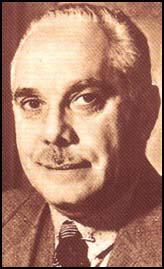Rafael Trujillo

Rafael Trujillo was born in San Cristobal, Dominican Republic, in 1891. After leaving school he worked as a telegraph operator. At the time Dominican Republic was occupied by the United States. In 1918 Trujillo joined the Dominican National Guard that had been created by the Americans. He made rapid progress in his new career and by the time the US Marines left in 1924 he was the head of the Dominican National Guard.
In 1930 Trujillo ran against incumbent Horacio Vasquez for president. Trujillo was able to use his power to win the election. He afterwards claimed he had won ninety five percent of the vote. After he gained power Trujillo established a secret police force that tortured and murdered the opposition to his rule.
Trujillo used his political control to obtain great personal wealth. He achieved support from the United States by becoming Latin America's leading anti-communists. Cordell Hull, US Secretary of State (1933-1944), defended Trujillo by saying: " He may be a son-of-a-bitch, but he is our son-of-a-bitch."
President Dwight Eisenhower began to change his opinion of Trujillo after the overthrow of Fulgencio Batista by Fidel Castro in January, 1959. Eisenhower observed that: "It's certain that American public opinion won't condemn Castro until we have moved against Trujillo."
The Central Intelligence Agency (CIA) also warned Eisenhower that Trujillo was so unpopular in Dominican Republic that it was only a matter of time before he became the victim of a left-wing revolution. Therefore it was suggested that the CIA should become involved in replacing him with a more suitable pro-American supporter. CIA's Black Operations (Executive Action) was brought in to remove Trujillo.
This plan had the support of President Romulo Betancourt of Venezuela. He told Eisenhower: "If you don't eliminate him, we will invade". A training camp was setup in Venezuela by Dominican exiles flown there from the United States and Puerto Rica by the CIA. This group had been recruited from the privileged sectors of Dominican society in order to make sure that the overthrow of Trujillo did not result in the establishment of a communist government.
Rafael Trujillo was assassinated on 30th May 1961 when his car was machine-gunned by a group of men on a quiet road outside the capital. Before the CIA could get their people in power, Rafael Trujillo Jr. rushed home from France and installed himself as the country's new ruler. Over the next six months he executed all his known opponents.
President John F. Kennedy favoured Joachim Balaguer as the temporary ruler of the Dominican Republic. As Kennedy remarked at the time: "Balaguer is our only tool. The anti-communist liberals are not strong enough. We must use our influence to take Balaguer along the road to democracy." To reinforce this policy a US naval task force with 1,800 US Marines aboard appeared off the Dominican coast on 19th November, 1961. As a result Trujillo and his supporters left the country. Once in power Balaguer began deporting all the major left-wing leaders in the Dominican Republic.
Juan Bosch was elected as the new president and took power in February, 1963. He was more left-wing than Kennedy and the CIA wanted. Bosch immediately announced a programme of public works, land reform, low-rent housing and the nationalization of selected businesses. He also ruled that communists and socialists would not be persecuted as long as they obeyed the law. The United States press now began comparing Bosch to Fidel Castro. The Miami News reported that: "Communist penetration of the Dominican Republic is progressing with incredible speed and efficiency."
The CIA now decided to use the Dominican Army to overthrow Bosch. In July, 1963, a group of army officers warned Bosch that the military would only continue to support him if he adopted a policy of "rigorous anti-communism". Bosch responded by going on television to announce that in a democratic society the military must remain out of politics.
Juan Bosch was overthrown as a result of a military coup in September, 1963. Newsweek Magazine reported that: "Democracy was being saved from Communism by getting rid of democracy."

